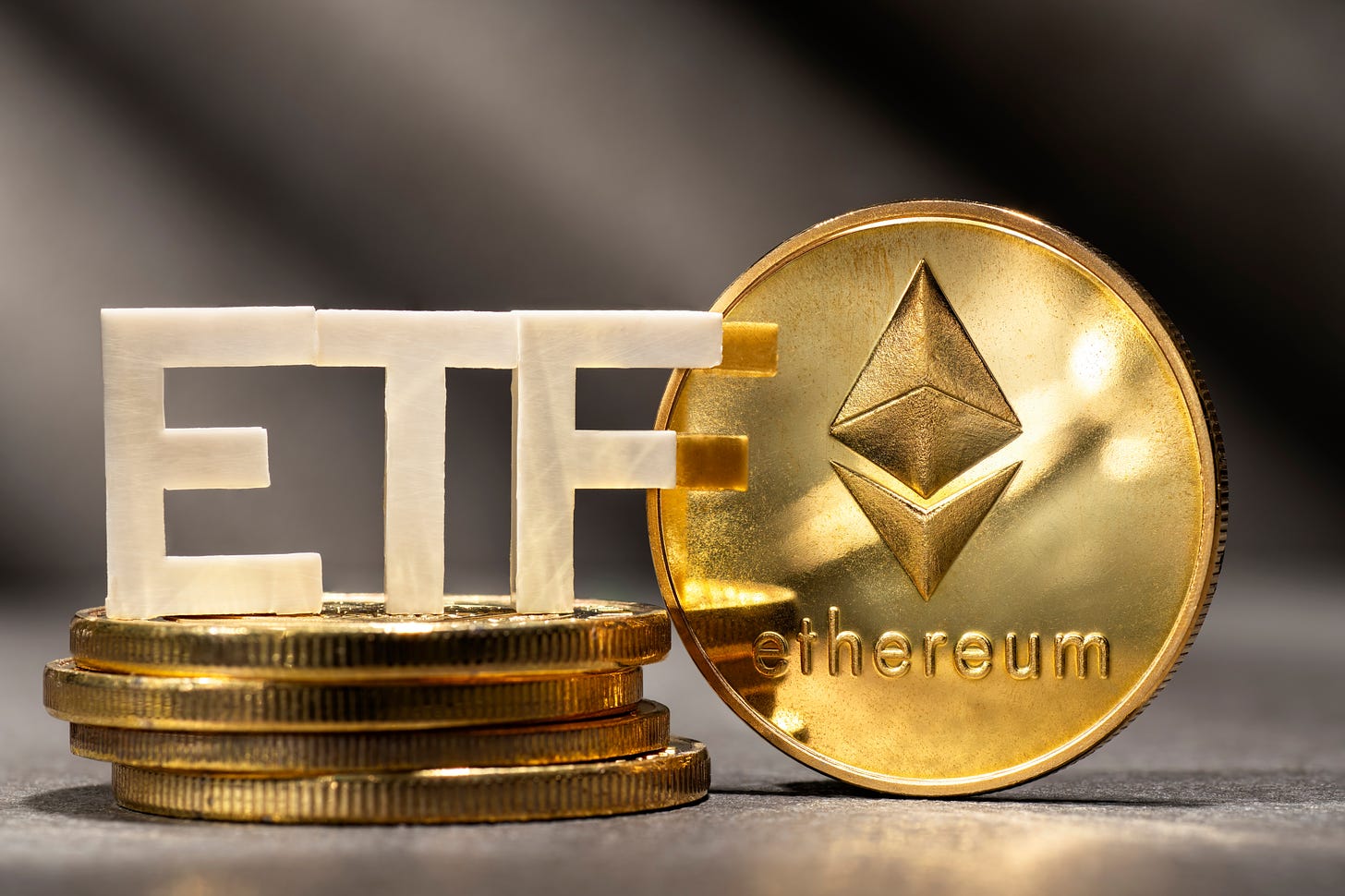Mt. Gox Bitcoin Repayments May Have Limited Impact 😯
Weekly News Recap: 🚀 VanEck files for Solana ETF and waives fees on ETH ETF, ⚖️ Coinbase sues SEC and FDIC, 🔄 FTX to poll creditors on reorganization plan, and more!
You are reading the Unchained Weekly newsletter, where we cover all the major news in the crypto space, providing insights into the market's latest trends, regulatory shifts, and technological advancements. Stay informed with your no-hype resource for all things crypto.
If you like Unchained: Refer us with a friend and earn a Premium subscription!
Why the Mt. Gox Repayments May Not Hurt the Bitcoin Price Much
Ten and a half years after filing for bankruptcy, Mt. Gox is finally set to disburse 142,000 Bitcoin worth nearly $9 billion to creditors between July and October.
Market concern has been growing over the potential impact on Bitcoin prices, but Alex Thorn, head of research at Galaxy, explains why only a small fraction of those bitcoins will be sold. He also discusses the implications of this redistribution on the market, the potential success of Ethereum ETFs, and the chances of a Solana ETF approval.
Listen to the episode on Apple Podcasts, Spotify, Pods, Fountain, Podcast Addict, Pocket Casts, Amazon Music, or on your favorite podcast platform. Or watch it on YouTube.
Weekly News Recap
VanEck Files for Solana ETF, Declaring SOL a Commodity
Investment manager VanEck filed for a spot Solana exchange-traded fund (ETF) in the US. This follows the SEC's approval of spot ETFs for Bitcoin and Ethereum. If approved, VanEck's proposed Solana Trust would be listed on the Cboe BZX exchange and would value its shares based on the MarketVector Solana Benchmark Rate.
Matthew Sigel, head of digital assets research at VanEck, announced the filing on Thursday, claiming that SOL functions similarly to Bitcoin and Ethereum, thus categorizing it as a commodity. This contrasts with the SEC's stance, which has previously classified SOL as a security in enforcement actions.

VanEck Waives Fees on Ethereum ETF as SEC Approval Nears
VanEck didn’t stop with Solana this week. The investment firm also plans to waive fees on its proposed spot Ethereum ETF until 2025, or until the fund's assets under management (AUM) reach $1.5 billion. VanEck’s Sigel said the strategy aims to establish the firm as a leader in crypto ETF fees and drive investor interest in Ethereum. He highlighted the potential for increased decentralized finance (DeFi) activity to boost ether prices, which will also benefit VanEck's holdings.
The SEC could approve several spot ether ETFs, including VanEck's, as soon as July 4, according to Reuters. Discussions are in their final stages, with only minor issues left to resolve.
Meanwhile, Ethereum entered its longest inflationary period since the Merge, with its circulating supply increasing steadily for over 70 days.
Coinbase Sues the SEC and FDIC for Regulatory Information
On Thursday, Coinbase, the largest US crypto exchange, filed lawsuits against the Securities and Exchange Commission (SEC) and the FDIC for failing to comply with Freedom of Information Act (FOIA) requests. These lawsuits, filed in Washington, D.C., seek to obtain documents about the agencies' approaches to crypto regulation. Coinbase alleges that regulators, including the SEC and FDIC, have deliberately pressured banks to deny crypto firms access to the federal banking system.
The lawsuits aim to reveal the SEC's internal stance on Ethereum and the FDIC's "pause letters," which instructed banks to halt crypto-related activities. Coinbase's actions reflect growing tensions between the crypto industry and federal regulators over the transparency and fairness of regulatory practices.
FTX to Poll Creditors on Reorganization Plan Amid Bankruptcy Proceedings
FTX bankruptcy advisers will begin soliciting creditors for feedback on the crypto exchange’s Chapter 11 reorganization plan. During a bankruptcy hearing on Tuesday, where lawyers for both FTX and its creditors debated a disclosure statement, Judge John Dorsey gave FTX’s advisers the greenlight to solicit creditors to vote on the plan, despite some creditors opposing it and demanding payouts in cryptocurrencies, rather than the dollar value as proposed. Creditors have until Aug. 16 to vote on the plan.
Andrew Dietderich, who represents FTX, highlighted the lack of major objections at the hearing, calling the plan "largely consensual." Conversely, David Adler, who represents three creditors, criticized the disclosure statement as "woefully inadequate" and raised concerns about significant tax implications if payouts are made in cash instead of crypto. Judge Dorsey is set to make his decision on whether to approve the plan on October 7.

Blast’s Airdrop Goes Live, Drawing Attention to Linea and Scroll
Blast, an Ethereum layer 2 scaling network, distributed 17 billion BLAST tokens in its eagerly awaited airdrop. The distribution began on Wednesday, with over 35% of the tokens claimed within hours, according to Parsec Finance’s blockchain explorer. This airdrop comes as Blast hit an all-time high in daily transactions and active addresses.
In a notable allocation, Blast also provided 3 billion BLAST tokens to the Blur Foundation, enhancing their governance participation. Both protocols were founded by Tieshun Roquerre, also known as “Pacman.” As of now, BLAST is trading at $0.024, valuing the airdrop at approximately $400 million.
With the Blast airdrop underway, attention is shifting to other Ethereum layer 2 networks such as Linea and Scroll. Both networks have seen increased activity and total value locked (TVL), as users anticipate potential future airdrops. Linea has grown by 15% in ether deposits over the past month, while Scroll’s TVL has surged by 40%, indicating strong interest in these platforms.
Julian Assange's Release Travel Costs Were Funded by Crypto Donations
Julian Assange, the founder of WikiLeaks, has agreed to plead guilty to a charge of illegally obtaining and disclosing national security material, resulting in his release from a British prison. This plea deal, expected to end his long-standing legal battle with the US, involves Assange serving a sentence equivalent to his time already spent in detention.
Assange's release travel expenses were nearly covered by a significant Bitcoin donation. An 8.07 BTC ($496,000) contribution quickly met most of the $520,000 needed for his charter flight to Australia. Additional funds were raised through various cryptocurrencies and fiat donations. The Free Assange campaign stated, "Julian’s health is in dire need of recovery. We are launching an emergency appeal to seek donations to help him cover the flight debt and ensure his recovery and well-being upon his arrival. Every contribution counts.”

Solana Foundation Unveils Blinks
The Solana Foundation introduced innovative tools that can turn any website or app into a gateway for crypto transactions. The first tool, named "Actions," enables users to perform onchain transactions directly from websites, social media platforms, and even QR codes. Another tool, "Blinks,” short for “blockchain links,” converts these actions into shareable links, making any URL a starting point for transactions on the Solana blockchain.
These tools aim to enhance mainstream adoption by integrating blockchain functionality into everyday digital platforms. Initial testing and utilization will involve teams such as Cubik, Tensor, Jupiter, Helius and several others.
Despite potential risks of malicious links, the Solana Foundation assures users that only trusted partner domains are whitelisted, adding an extra layer of security to these new tools.
FBI Increases Bounty for 'Crypto Queen' Ruja Ignatova to $5 Million
The U.S. Department of State has raised the reward for information leading to the capture of Ruja Ignatova, also known as the "Crypto Queen," to $5 million. Ignatova, who vanished in 2017, was the mastermind behind OneCoin, a fraudulent cryptocurrency scheme that defrauded investors of over $4 billion. Despite reports of her alleged murder, the FBI remains committed to finding her.
OneCoin, launched in 2014, was marketed as a revolutionary cryptocurrency but was actually a Ponzi scheme. Ignatova disappeared after a US warrant was issued for her arrest. The FBI suggests she may have altered her appearance or started using a false passport.
Meanwhile, other OneCoin associates have faced justice. Co-founder Karl Sebastian Greenwood received a 20-year sentence, and legal chief Irina Dilkinska was sentenced to four years. The increased bounty aims to bring Ignatova to justice and provide closure to the victims of OneCoin's fraudulent activities.

Ripple CEO Criticizes SEC Chair, Predicts Political Impact
Ripple CEO Brad Garlinghouse claimed that SEC chair Gary Gensler will cause President Joe Biden to lose the upcoming election. Garlinghouse's comments followed Gensler's remarks at the Bloomberg Invest Summit, where Gensler highlighted significant non-compliance occurring in the crypto industry and the legal troubles of several prominent figures.
Garlinghouse, responding on X, criticized Gensler for his stance and handling of past incidents such as the FTX collapse. He argued that Gensler's actions are detrimental to both the crypto industry and the Biden administration's political prospects.
On this week’s Tuesday episode of Unchained, crypto lawyer Sam Enzer called Gensler one of the most controversial chairs in recent history, citing multiple missteps including the SEC's misrepresentations to a judge in the Debt Box case and Gensler's evasive responses to Congress about investigating ether. Enzer questioned the Democrats' commitment to being pro-crypto and pro-innovation while keeping Gensler in his position.







